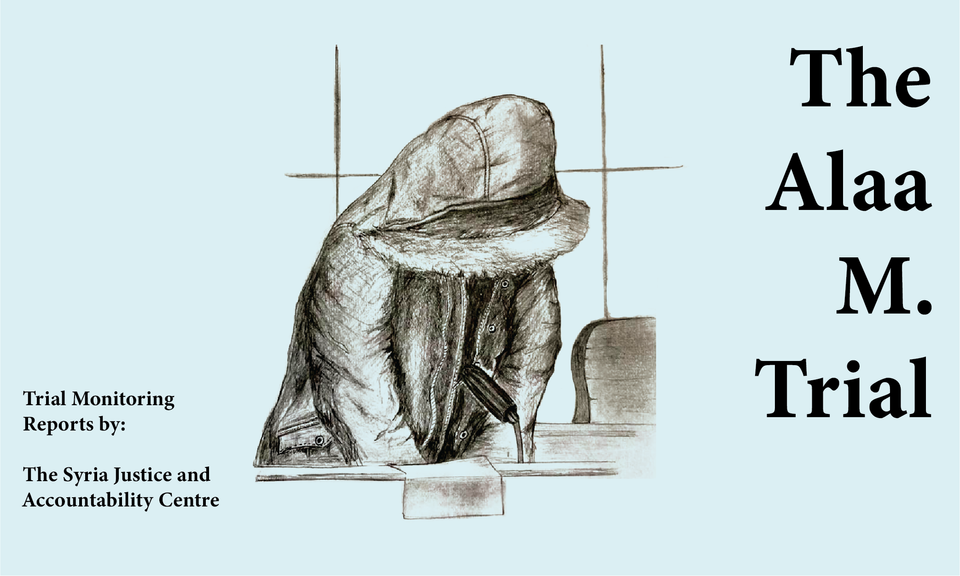
Inside the Alaa M. Trial #38: Night Shifts
Higher Regional Court – Frankfurt, Germany
Trial Monitoring Summary #38
Hearing Dates: March 21, 2023
CAUTION: Some testimony includes descriptions of torture.
Note that this summary is not a verbatim transcript of the trial; it is merely an unofficial summary of the proceedings.
Throughout this summary, [information located in brackets are notes from our trial monitor] and “information placed in quotes are statements made by the witness, judges or counsel.” The names and identifying information of witnesses have been redacted.
SJAC’s 38th trial monitoring report details day 62 of the trial of Alaa M. in Frankfurt, Germany. The Judges continued their questioning of the witness who worked with the Accused as a doctor in Homs Military Hospital. They started by asking about a surgery the Accused allegedly performed without administering anesthesia. The Judges further wanted to know why the witness considered the Accused to be an immature and ostentatious person. Upon questioning, the witness divided the individuals who allegedly committed torture into two types and restated his analysis of the motives of the Accused to indulge in it.
In the ensuing questioning about the hospital's prison, the witness recalled that the Accused stayed up during several nights with other persons who had access to it. The witness recounted a situation in which the head of the prison bragged about his superiority over the Intelligence Branches in extracting confessions from detained patients. The proceedings concluded with a question about some individuals who had a prominent security role in the hospital. The witness recounted situations in which he was directly and indirectly threatened.
Highlights:
Day 62 – March 21, 2023
The Judges continued their questioning of P15 and began with questions about the surgery M. allegedly performed without administering anesthesia. The Judges recalled the names of some doctors mentioned by P15 in the previous session. According to P15, they were present when M. told the group about the operation he performed. The Judges asked if P15 was sure that a certain doctor was present at the time. P15 affirmed the presence of certain doctors in that situation but was unsure about others. Subsequently, the Judges asked P15 about the time and place where the surgery allegedly took place. P15 described as many details as he could recall. P15 remembered that M. had performed surgery on his own for which he was not qualified. P15 added that M.’s refusal to anesthetize the patient was intended to inflict harm on the patient and was part of the torture mechanisms in Homs Military Hospital.
In the previous session, P15 described M. as an ostentatious person. Today, the Judges asked P15 to explain the reasons for his judgment. The Judges also wanted to know why P15 considered M. an immature person which he also previously testified. P15 replied that someone with traits such as being a show off is an immature and irresponsible person. Subsequently, P15 classified the people who tortured the patients into two groups. According to P15, one category tortured on sectarian grounds. The second category considered itself part of the war. Members of this group killed and tortured their "enemies" or else, they would take revenge on them and their families. P15 assumed that M.'s personality drove him to this behavior since all of a sudden he was given unchecked power to torture. Additionally, P15 concluded that those who tortured drew attention and made a name for themselves with the chief doctor who was responsible for the group that conducted the torture.
In the ensuing questioning, the Judges focused on the hospital's prison and whether it was under administration of the Intelligence Services. P15 explained that the prison was part of the hospital and administered by the Military Police. P15 recounted a situation which he witnessed himself. He heard the head of the Military Police detachment speaking with the head of one of the Intelligence Branches over the phone, saying: “The confessions you take in the Military Police’s prison in Homs Military Hospital, you cannot obtain in other Intelligence Branches in Homs.” P15 then explained that certain people had access to the prison, including M. This group sometimes stayed up at night in the prison which became an interrogation and torture center.
The Judges further asked about the head of the hospital’s prison whom P15 described as one of the most brutal torturers. The Judges continued by asking details about the chief doctor who was responsible for torture and showed a picture of him on the screen in the courtroom. P15 recognized him, confirming that he was the same person. The Judges concluded by asking P15 about a situation in which the witness was described as an “enemy.” P15 recounted what happened in three situations: one where he was threatened with expulsion from the hospital “because he refused to treat the wounded of the homeland.” In another instance, he was reprimanded for being in the emergency department when he was not on duty that day, indicating that he was not welcomed there because he was not trusted. In a third situation, P15 heard a conversation between two pro-government doctors who were preparing to go to a field hospital. They insinuated that “they have to kill the terrorists in the hospital before they fight those outside.” P15 said that at that time he clearly understood that they meant him.
For more information or to provide feedback, please contact SJAC at [email protected] and follow us on Facebook and Twitter. Subscribe to SJAC’s newsletter for updates on our work.